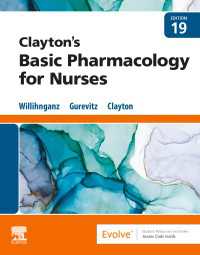Full Description
This is a time of challenge for teachers with burgeoning workloads and unsustainable conditions, parental demands and challenging student behaviour. Within this climate of challenge, including that of teacher retention, education systems around the world have had to develop strategies to professionalise and improve the status of teaching.
Divided into three distinct sections covering the future of teacher professionalism, reimagining pedagogical practices in challenging contexts, and professional learning to meet the needs of the profession, Critical Conversations in Teacher Education explores issues across the lifespan of teaching, including initial teacher education and in service professional learning. Drawing on research conducted broadly in the Australian educational space, chapter authors discuss the areas of culturally responsive practice, AI, climate change, classroom environments, micro credentials, and teacher retention.
The research covers a wide range of settings, from early childhood through to primary and secondary settings as well as exploring a wide range of topics that are of interest to educators both in schools and at a system level and offers valuable considerations for shaping the future of the teaching profession.
Contents
Introduction; Helen Stokes and Larissa McLean Davies
Section 1: Shaping the Future of Teacher Professionalism
Chapter 1. Attracting and Retaining Rural Teachers: A Matter of Resources or Regard?; Hernan Cuervo
Chapter 2. Leadership Literacy: The Role of Leadership Education in the Attraction, Retention, and Succession Planning of Future Leaders; Amanda Samson and Daniela Acquaro
Chapter 3. Retaining Teachers in the Profession in Australia and Sweden: A Comparative Analysis; Adam Taylor, Pauline Thompson, and Sandra Lund
Chapter 4. Developing Teachers' Spatial Competency: A Tripartite Model of Professional Learning and Development; Marian Mahat
Section 2: Reimagining Educational Practices in Challenging Contexts
Chapter 5. Towards Culturally Responsive, Trauma-Informed Education: Navigating Social Complexity in Australian Schools; Monique Langley-Freeman, Jack Greig, Tom Brunzell, Jessica Gannaway, and Melitta Hogarth
Chapter 6. Speculating on and with GenAI: Responsive and Responsible Postdigital Pedagogies; SWISP Lab, Sarah Healy, Kathryn S. Coleman, and Vanessa Riley
Chapter 7. Teaching in the Anthropocene: Navigating Educational Realities in Times of Crisis; SWISP Lab, Kathryn S. Coleman, and Sarah Healy
Section 3: Professional Learning to Meet the Needs of the Profession
Chapter 8. Engaging Vulnerable Children in Education: The Role of Professional Learning to Support Leaders and Teachers; Helen Stokes, Tom Brunzell, and Robert Sbaglia
Chapter 9. Building Knowledge and Capacity: Highlighting the Professional Agency of Teachers; Bree Hurn, Helen Cozmescu, and Martina Tassone
Chapter 10. Reflections on the Development of a Professional Learning Capstone: Why it Matters; Pip Robinson
Chapter 11. Teacher Education as a Site for Critical Conversations on Continuity of Learning Practices; Natasha Ziebell, Jane Page, Larissa McLean Davies, Jessica Gannaway, Michele Hinton Herrington, and Sue Mentha








